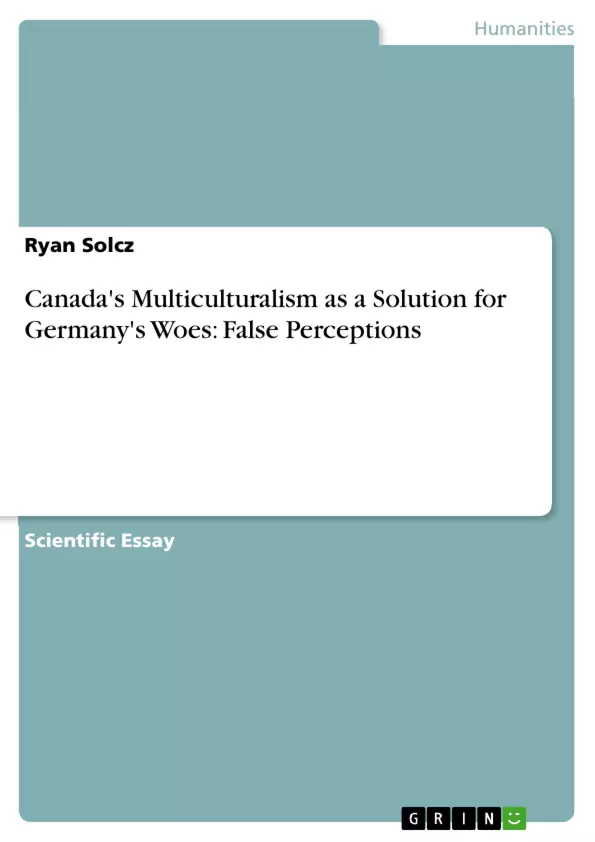This paper discusses the possibility of Germany's adapting Canada's multicultural system. This has already been subject of discussion by Geißler and Klingholz. Contrary, however, to their beliefs, we argue that Canada has little to teach Germany with respect to immigration. The first part of the paper identifies immigration as a problem in Germany. The second portion takes an indepth look of the Canadian system. The third section discusses where practical solutions could lie for Germany.
Inhaltsverzeichnis (Table of Contents)
- Trouble with Immigration in the Land of Goethe?
- The Imperfect Canadian Multicultural Model
- What does "Multiculturalism" actually mean?
- Immigration Issues in Canadian Society
Zielsetzung und Themenschwerpunkte (Objectives and Key Themes)
This paper examines the ongoing debate regarding the adaptation of Canada's multicultural system in Germany. It first establishes the existence of an immigration crisis in Germany. The paper then analyzes the Canadian multicultural policy to determine its applicability to Germany's current situation, arguing against the common assertion that Canada offers a readily transferable model. Finally, it explores alternative solutions for Germany.
- The immigration crisis in Germany.
- Analysis of the Canadian multicultural policy.
- Comparison of the Canadian and German contexts for immigration policy.
- Assessment of the transferability of the Canadian model to Germany.
- Exploration of alternative solutions for Germany's immigration challenges.
Zusammenfassung der Kapitel (Chapter Summaries)
Trouble with Immigration in the Land of Goethe?: This chapter lays the groundwork for the paper by establishing the existence of a significant immigration problem in Germany. It highlights the social and political rift between migrant communities and the German majority, emphasizing Germany's historical reluctance to embrace itself as a nation of immigrants. The chapter points to issues such as a two-tiered societal structure, low political participation among migrants, higher reliance on social welfare, and disparities in educational attainment between migrants and native Germans as evidence of the crisis. This sets the stage for the subsequent analysis of the Canadian model and the search for alternative solutions.
The Imperfect Canadian Multicultural Model: This chapter delves into a critical analysis of the Canadian multicultural model, challenging the notion of its unqualified success and suitability as a solution for Germany. It begins by dissecting the ambiguous nature of the term "multiculturalism" itself, showing its multiple interpretations and lack of a universally agreed-upon definition. The chapter explores the symbolic, political theoretical, and judicial aspects of Canadian multiculturalism, revealing inconsistencies and limitations in its practical implementation. The chapter demonstrates that Canadian public opinion on immigration is not uniformly positive, contradicting the often-idealized portrayal of the system, and identifies specific problems existing within Canadian society relating to immigration despite the stated policy of multiculturalism.
Schlüsselwörter (Keywords)
German immigration, Canadian multiculturalism, immigration policy, societal integration, migrant communities, educational attainment, social welfare, political participation, national identity, comparative analysis, policy transferability.
Frequently Asked Questions: Trouble with Immigration in the Land of Goethe? and The Imperfect Canadian Multicultural Model
What is the main topic of this paper?
This paper examines the ongoing debate about adapting Canada's multicultural system to address Germany's immigration challenges. It questions the assumption that Canada's model is easily transferable to Germany.
What problem does the paper identify in Germany?
The paper identifies a significant immigration crisis in Germany, characterized by social and political divisions between migrant communities and the German majority, a two-tiered societal structure, low political participation among migrants, higher reliance on social welfare by migrants, and educational disparities between migrants and native Germans.
What is the paper's approach to analyzing the Canadian model?
The paper critically analyzes the Canadian multicultural model, challenging its perceived unqualified success and suitability for Germany. It explores the ambiguous nature of "multiculturalism," its various interpretations, and inconsistencies in its practical implementation in Canada.
What are the key themes explored in the paper?
Key themes include the immigration crisis in Germany, an analysis of Canadian multicultural policy, a comparison of the German and Canadian contexts for immigration policy, an assessment of the transferability of the Canadian model to Germany, and an exploration of alternative solutions for Germany's immigration challenges.
What are the chapter summaries?
The first chapter establishes the existence of a significant immigration problem in Germany. The second chapter provides a critical analysis of the Canadian multicultural model, highlighting its limitations and questioning its applicability to the German context.
What are the key words associated with this paper?
Key words include German immigration, Canadian multiculturalism, immigration policy, societal integration, migrant communities, educational attainment, social welfare, political participation, national identity, comparative analysis, and policy transferability.
What is the overall conclusion of the paper (implied)?
The paper implies that a direct transfer of the Canadian multicultural model to Germany is unlikely to be successful due to significant differences in context and the inherent limitations of the Canadian model itself. It suggests a need for exploring alternative solutions tailored to the specific German situation.
What does the paper say about Canadian public opinion on immigration?
The paper indicates that Canadian public opinion on immigration is not uniformly positive, contradicting the often-idealized portrayal of the Canadian multicultural system.
What aspects of Canadian multiculturalism are examined?
The paper examines the symbolic, political theoretical, and judicial aspects of Canadian multiculturalism, revealing inconsistencies and limitations in its practical implementation.
- Arbeit zitieren
- Ryan Solcz (Autor:in), 2010, Canada's Multiculturalism as a Solution for Germany's Woes: False Perceptions, München, GRIN Verlag, https://www.grin.com/document/193434



